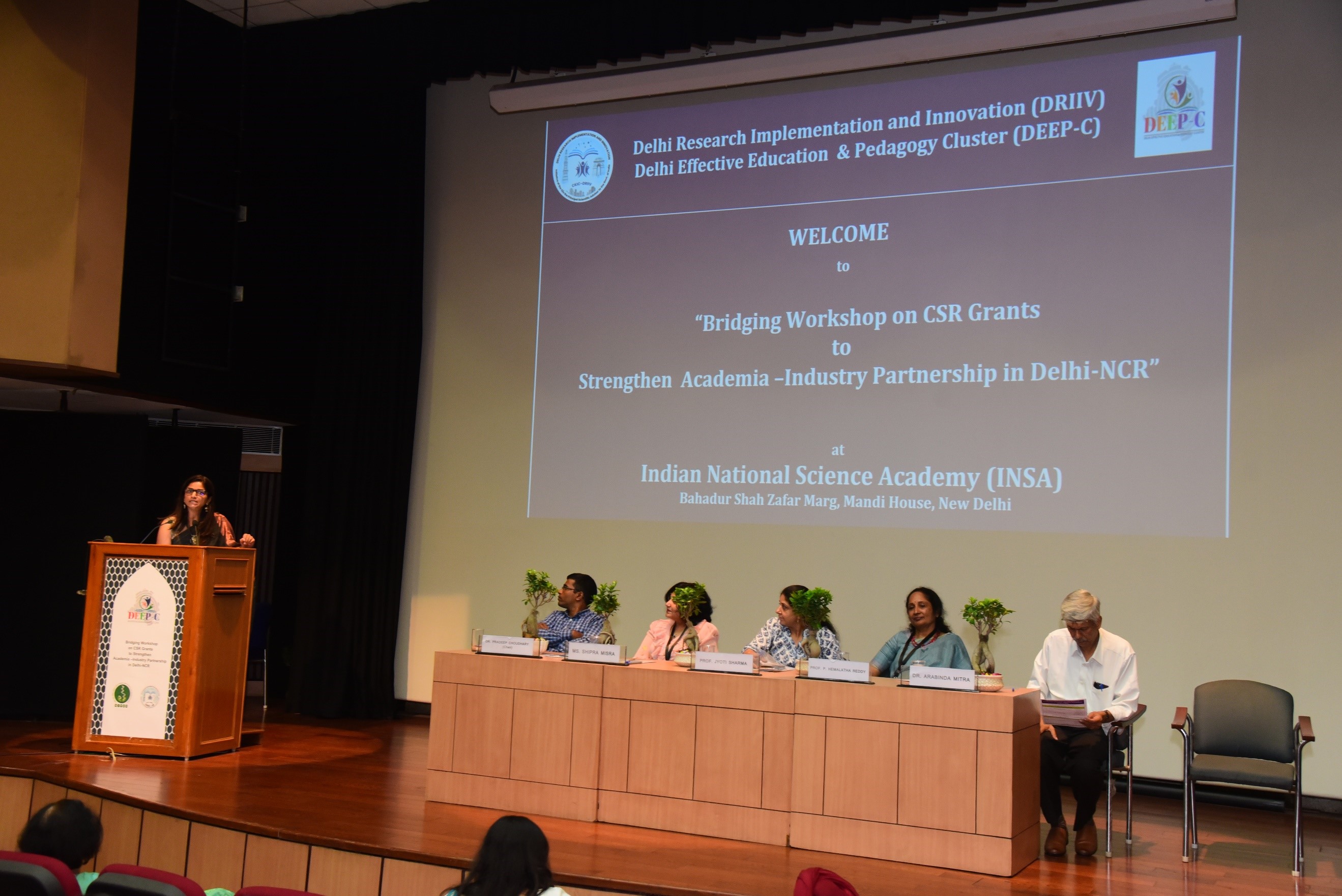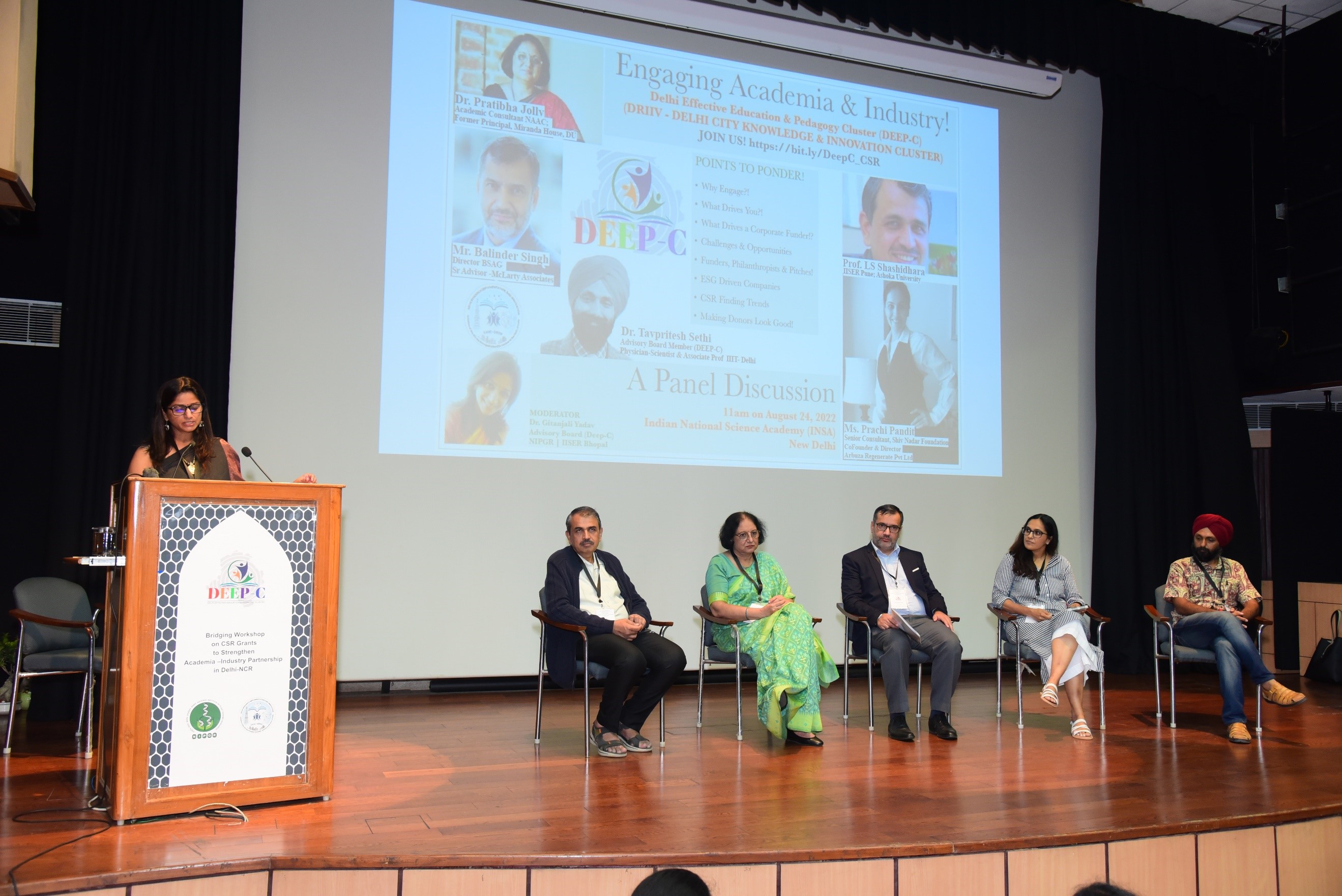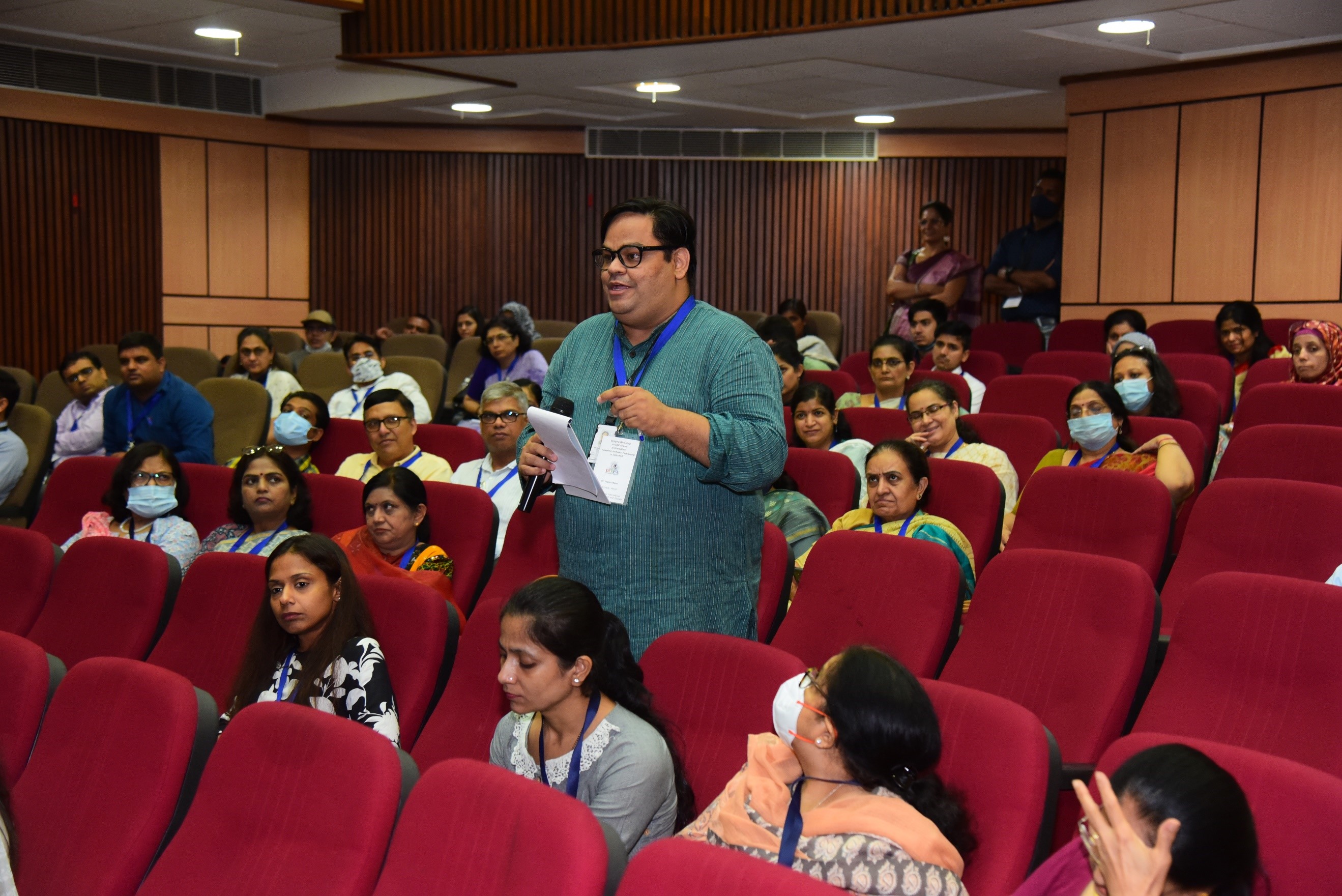
- A+
- A
- A-
A key role of science and technology (S&T) clusters is to spearhead academia–industry engagements to address major industrial, environmental, and societal challenges. Fulfilling this role, the Delhi Research Implementation and Innovation (DRIIV), which is the Delhi S&T cluster under the Office of the Principal Scientific Adviser (PSA) to the Government of India, has embarked upon creating such a collaborative network towards fostering research and development (R&D) activities through an interdisciplinary approach. Recently, Delhi Effective Education and Pedagogy Cluster (DEEP-C), the education vertical of DRIIV created during the pandemic, organised its first physical event called, “Bridging Workshop on CSR Grants to Strengthen Academia–Industry Partnership in Delhi–NCR.” Approximately 100 faculty and students from colleges and universities from across Delhi–NCR attended the event, which also brought together representatives from the Office of the PSA, corporate social responsibility (CSR) foundations, non-governmental organisations (NGOs), start-ups, and research and academic institutions.
Dr. Gitanjali Yadav from the National Institute of Plant Genome Research, who is on the advisory board of DEEP-C and was convener at the event, opened the event and shared the main objective of the workshop: generating knowledge and awareness about building a culture of academia–industry partnerships, seeking CSR funding, and promoting integration between colleges and funding agencies.

Inaugural session of the workshop. Dr. Gitanjali Yadav is introducing the speakers. From left to right: Chair, Dr. Pradeep Kumar Choudhury, Shipra Misra, Prof. Jyoti Sharma, Prof. Hemalatha Reddy, and Dr. Arabinda Mitra.
Image credits: DEEP-C
Shipra Misra, Managing Director and CEO of DRIIV, then spoke about the ongoing efforts at DRIIV across six thematic areas, with emphasis on solid waste management, waste to wealth programs, alternate energy, and water security (the Amrut programme). She highlighted sustainability as the driving principle for all DRIIV initiatives and gave a few examples of industry engagement with students and educational institutions which were facilitated by DRIIV. She commented, “We can no longer rely on the ‘jugaad system’ and as a nation must focus on leveraging breakthroughs of science and technology to reach the 5 trillion-dollar economy target by 2024.”
Prof. Jyoti Sharma, Director of the Institute of Lifelong Learning and member of DEEP-C’s advisory board, followed to set the stage by wording DEEP-C’s vision as, “Creating an active, integrative, channelizing, and stimulating educator community that shares expertise, collaborates, and is willing to participate at multiple levels towards community building through the instrument of education.” In a persuasive tone, Prof. Sharma mentioned the role of educators in realising the focus of the National Education Policy (NEP) 2020 by training the students for problem solving, critical thinking, and entrepreneurial skills to enable them to handle the socio-economic problems of the society. She highlighted the role of DEEP-C in facilitating and enabling teachers to upskill and hone their expertise in education innovation, by exploring CSR funding and student engagement in research projects that address societal challenges or needs.
Prof. Hemalatha Reddy, Former Principal of Sri Venkateswara College, Delhi University, mentioned the concept of ‘academic social responsibility’ and commented, “Unless we come forward as teachers nobody will solve our problems and cater to our needs as educators.” She stated that undergraduate institutions train the future human resource for the industry, yet there are huge skill gaps that remain, and industry ends up re-training the students. Speaking from her experiences with student-centric academia–industry engagements in Hyderabad and the e-YUVA scheme by the Biotechnology Industry Research Assistance Council (BIRAC), she informed the audience about the importance of skilling students to the needs of the industry and suggested CSR funding as one way of approaching this goal.
The keynote speaker, Dr. Arabinda Mitra, Honorary Distinguished Fellow at the Office of the PSA, spoke on government interventions to strengthen the academia–industry connect. He mentioned four policy changes with respect to CSR funding. First, CSR money will be opened up for innovation research at R&D institutions rather than being confined to supporting incubators. Second, CSR money will be used to support any activity under the United Nations Sustainable Development Goals (UN SDGs). Third, all central ministries are mandated to have a budget line that supports converting research into products. Lastly, all public sector undertakings (PSU) must invest 2% of their profits before tax into R&D. He commented, “We believe these measures will unleash around 10,000 crores in R&D funding for the country.”
He added, “S&T cannot be business as usual; with the new challenges of pandemics, climate change, and supply chain break, it is critical that scientists and technologists work by keeping in mind society as the centrepiece.”
Dr. Mitra further commented on the need to sensitize industries towards working with academic institutions and shared that soon industry-led S&T clusters will be on the ground to promote active partnerships with academia and the government. Finally, he concluded with mention of how the government is envisaging the promotion of R&D in tier 1 and 2 institutions to increase the critical mass of scientists and technologists in the country and is planning to prioritise funding for social sciences research.
While the morning session focussed on informing the audience on the efforts of DRIIV, DEEP-C, and the Office of the PSA towards bridging academia–industry gaps, the forenoon session delved more deeply into the theme via a panel discussion with doyens from both the worlds.
Prof. L. S. Shashidhara, who is a Professor at Ashoka University and Program Coordinator at DEEP-C, highlighted that industry is the channel through which solutions for real life problems are found, and industry is how these solutions reach the masses on a large scale. He stressed on the aim of higher education to create students capable of solving real life problems and emphasised the need for academia–industry engagement in this context. He remarked that “90% of the jobs are in industry. If we fail to provide our students with real life scenarios, the true experiences of identifying an issue, and the process to working around it by application of knowledge and technology, we are doing an injustice to them.”

Panel discussion on “Bridging the academia–industry gap.” Panel experts from left to right: Prof. L. S. Shashidhara, Dr. Pratibha Jolly, Balinder Singh, Prachi Pandit, and Dr. Tavpritesh Sethi; with Dr. Gitanjali Yadav as moderator.
Image credits: DEEP-C
Dr. Pratibha Jolly, Academic Consultant at the National Assessment and Accreditation Council (NAAC) shared her own story of obtaining funding as an undergraduate faculty towards building education through ‘doing-based models’ of teaching. She concluded by saying, “We create an ecosystem where we innovate and ideate, reach out, and more importantly, give, in the form of individual social responsibility towards building a community of practice for mainstreaming our efforts for improving education, research, and its impact.”
Balinder Singh, a public policy innovator, shared his experiences on building collaborations across corporations, NGOs, businesses, and media communications. He pointed out that opportunities for bridging the divide between industry–academia–government always existed but siloed thinking has been a huge impediment; however, the scenario is shifting hugely towards such partnerships. He shared the motivation and fine points behind the three types of CSR funding: philanthropy, family run foundations, and corporates.
Prachi Pandit, current CEO of Arbuza Healthcare and a former researcher and consultant at the Shiv Nadar Foundation, commented, “If you are an academician trying to be productive in the CSR funding landscape, it is very important to unlearn many things.” She talked about four things that academicians need to approach differently in the CSR arena: communication in terms of quality and frequency, improved practices of resource allocation and utilization, transparency framework, and a reduction of administrative paperwork. She concluded, “Academicians need to create a framework on how to get CSR money, how to use it, and finally, report it back to the stakeholders.”
Dr. Tavpritesh Sethi, Group Leader at Indraprastha Institute of Information Technology, Delhi, shared his experiences of interfacing with the industry as a clinical healthcare researcher. He emphasized, “Industry is looking for products that can be deployed at scale, a demand that is often not met by academicians.” He highlighted the importance of creating interfaces that can abstract away the complexities of academia to create value for a broader set of people.
The panel discussion ended with questions from the audience to the experts.
Two short talks by Rahul Kulshreshtha from the Strategic Alliances Division of the Office of the PSA and Leena Kukreja from the Indian Office of Science and Innovation at the Embassy of Sweden, provided information on several huge funding opportunities. While Rahul spoke about ‘Manthan’, India’s exclusive platform for driving R&D coalitions between academia and industry, where one can apply for projects, share ideas, and seek funding; Leena described how the triple helix model of innovation helped Sweden gain its status of ‘topmost country in innovation’. She also mentioned opportunities for mutual international co-operation at various levels of education and research.

One of the participants posing a question to the expert panel during the panel discussion on “Bridging the academia-industry gap.”
Image credits: DEEP-C
Post lunch, I began the afternoon session with a tutorial on writing effective CSR grant proposals, which I conducted on behalf of Cactus Communications Pvt. Ltd., a research communication company where I work. I gave an overview of the history and present status of CSR, its legal framework, activities that fall under the purview of CSR, and the initiatives started by the government to promote CSR interventions for societal impact. I further discussed CSR donor mapping, alignment of project activities with CSR mandates, CSR policy documents, and fine points about writing grants. In addition, I presented case studies and explored examples of common gaps in grant proposals.
The last leg of the DEEP-C event covered case studies and success stories of environmental conservation and plastic waste management. Dr. Suresh Babu, Dean at the School of Ecology and Director at the Centre for Urban Ecology and Sustainability in Ambedkar University Delhi, shared his fascinating work on urban sustainability and conservation. He presented the case of the Dheerpur Wetland Restoration Project, citing student participation as a model of learning using a field-based learning approach. Dr. Harsh Mehrotra shared the details of ‘Blue Nudge Fellowship Programme’ to invite student participation from Delhi University colleges in waste segregation and behavioural change to promote sustainability and solid waste management. He also informed about the recent programme initiated by his foundation in Delhi–NCR schools via a Memorandum of Understanding with DEEP-C and DRIIV.
In the valedictory session, Prof. Shashidhara invited the participants to use DEEP-C as a platform for mutual consultation and actively contribute to the activities of DRIIV and DEEP-C as education collaborators. He spoke about colleges contributing to real research and collecting data on city problems via student engagement and working together with other institutions in the Delhi cluster. “We are all connected, we can work on the same problems by bringing them to our colleges and implementing some key aspects of NEP 2020,” he concluded.
Overall, the event generated energy, aspirations, and thoughtful reflection among the education community of the Delhi–NCR.
Dr. Adita Joshi is a science education and communication consultant, and a freelance science writer.




